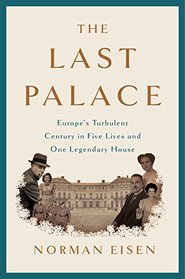Through the story of the Petschek Villa in Prague, The Last Palace by Norman Eisen walks through decades of European history - from the 1920s, through World War II, through the Cold War, and to an emergence into current times. By weaving his mother's story throughout the book, Mr. Eisen brings the impact of this history down to an individual level. The history reads like a well-crafted story.
Read my complete review at http://www.memoriesfrombooks.com/2019/02/the-last-palace.html
Reviewed for the Penguin First to Read program.
Read my complete review at http://www.memoriesfrombooks.com/2019/02/the-last-palace.html
Reviewed for the Penguin First to Read program.
Leo T. reviewed The Last Palace: Europe's Turbulent Century in Five Lives and One Legendary House on + 1775 more book reviews
I have not yet seen the book but it received a favorable review in The Economist, 8 September 2018, p. 72, "Czech Fates."
The essays notes that 'The 100-room palace has little architectural merit; its strength is its history. Mr. Eisen focuses on three characters: Otto Petschek, a Jewish coal financier who built the residence in the 1920s; Rudolf Toussaint, a general who lived in it during the Nazi occupation; and Laurance Steinhardt, an American ambassador who claimed it in 1945.'
The reviewer says that later ambassadors are also covered but s/he found that text to be of little interest.
Petschek died before the takeover of Czechoslovakia and his family wisely beat feet and survived. General Toussaint held the SS in contempt, did not trash the place, and was instrumental in derailing plans to destroy Prague in 1945. Ambassador Steinhardt labored mightily to prevent the country from falling into the USSR orbit, but failed.
The essays notes that 'The 100-room palace has little architectural merit; its strength is its history. Mr. Eisen focuses on three characters: Otto Petschek, a Jewish coal financier who built the residence in the 1920s; Rudolf Toussaint, a general who lived in it during the Nazi occupation; and Laurance Steinhardt, an American ambassador who claimed it in 1945.'
The reviewer says that later ambassadors are also covered but s/he found that text to be of little interest.
Petschek died before the takeover of Czechoslovakia and his family wisely beat feet and survived. General Toussaint held the SS in contempt, did not trash the place, and was instrumental in derailing plans to destroy Prague in 1945. Ambassador Steinhardt labored mightily to prevent the country from falling into the USSR orbit, but failed.




